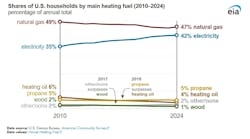Electric Heating Gains Ground as U.S. Homes Shift Away from Natural Gas
An increasing share of U.S. households is turning to electricity as their primary source of space heating, according to new data from the U.S. Census Bureau’s American Community Survey. In 2024, 42% of households reported using electricity as their main heating fuel, while 47% relied on natural gas. Although natural gas remains the dominant heating source, its share has fallen from 49% in 2010.
The shift toward electric heating reflects a combination of population trends, technology improvements, and policy changes. As more Americans move to southern and western regions with milder climates, overall demand for space heating has declined. In these warmer areas, electric heating—often through air-source heat pumps—has become a practical and efficient choice.
Data from the U.S. Energy Information Administration’s Residential Energy Consumption Survey (RECS) show that homes exposed to warmer temperatures throughout the year are more likely to use electricity for space heating or report not using fuel at all. In colder regions, propane, heating oil, and wood remain more common.
Technology advancements have also accelerated this shift. New generations of cold-climate heat pumps provide reliable performance and higher efficiency, even in regions that historically relied on combustion-based heating. Additionally, several state and local governments have enacted policies restricting natural gas use in new residential construction, citing indoor air quality and emissions concerns. Many of these policies face legal challenges, but they have nonetheless contributed to the growth of electric heating installations.
Households tend to use the same energy source for multiple end uses. Homes heated primarily with natural gas are more likely to also use gas for water heating, cooking, and clothes drying. Similarly, homes using electric space heating often rely on electricity for these functions as well.
Earlier this year, the EIA released its first set of monthly consumption and expenditure estimates for electricity and natural gas. These data illustrate clear seasonal patterns—natural gas use peaks in the winter due to heating demand, while electricity consumption rises in both summer and winter for cooling and heating needs.
For HVAC contractors, these findings reinforce the growing importance of electric heating technologies, particularly heat pumps, in residential markets. As homeowners, builders, and policymakers continue to prioritize efficiency and electrification, the demand for skilled installation and service expertise in electric systems is expected to expand nationwide.

